Operating Systems Tasks and Programming Lab
| ✅ Paper Type: Free Essay | ✅ Subject: Computer Science |
| ✅ Wordcount: 204 words | ✅ Published: 16 Aug 2017 |
Lab Activity 1 – Operating Systems Tasks and Programming
a) Future of operating systems.
[Report on the future of operating systems here]
b) Programming activity
C++
- #include
- using namespace std;
- int main() {
- Â int id = 6669447;
- string name = “Salman Mohammed Fazal”;
- int counter = 0;
- for (int i = 0; i < name.length(); i++) { //for every character
- cout << name[i] << flush; //print characters on the same line
- counter++; //increment counter
- if (counter == id[-1]) { //if counter = last character of ID
- cout << endl; //jump to next line
- counter = 0; //reset counter
- }
- }
- }
JAVA
- public class test {
- public static void main(String[] args) {
- int id = 6669447;
- String name = “Salman Mohammed Fazal”;
- int counter = 0;
- for (int i = 0; i < name.length(); i++) { //for every character
- System.out.print(name.charAt(i)); //print character
- counter++; //increment counter
- if (counter == id[-1]) { //when counter is last character of ID
- System.out.println(); //new line
- counter = 0; //reset counter
- }
- }
- }
- }
PYTHON
- name = “Salman Mohammed Fazal”
- id = “6669447”
- for i in range (0, len(name), int(id[-1])): #for every n characters
- print(name[i:i+ int(id[-1]))]) #slice and print string
Code Outcome (same for all)
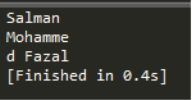
Lab Activity 2 – Linux Command Line (Commands and outcomes from a series of small tasks that require use of a number of Linux commands)
- How made Portfolio1 directory read/write/executable only for you and your group. That is, not for others. Show evidence of this with ls command.
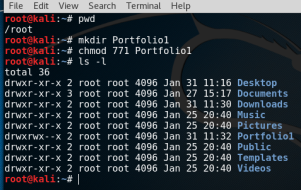
- How downloaded the script http://www.centerkey.com/tree/tree.sh to your home directory using wget and make it executable.
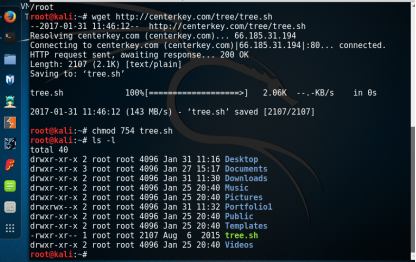
- Making Directories
- How created a 207se directory in your Portfolio1 directory.
- How created numbered directories for the labs. i.e. lab1 and lab2 etc.
- Evidence of transferring lab1 activity into appropriate directory
- Evidence of make directory activities using tree.sh


- Display todays date and using the cal command show the month that you were born.
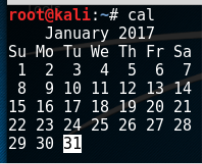
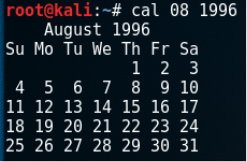
- Move into the lab1 directory and use the appropriate command to show the current directory

- What is talk, write and wall are for
The Talk command is used for exchanging messages with other users who are logged on the same network.
The Write command is used to send messages to users in the same network. This one-way only.
The Wall command is used to send messages to all the users in the entire network. This is limited to the admins only.
- Â What command prevents the effects of those three commands from interrupting you.
To prevent users from interrupting you, you can use the Mesg command. This command basically enables or disables users from writing to your terminal. ‘Mesg y’ to Allow access and ‘Mesg n’ to deny access.
- The song in song.txt.
- Using wc the number of words and lines in the file.
- Using grep to get the lines containing “and” and the number of the lines contain “and” in the document
- Use cat to show the contents of the file.
- Appropriate Linux command to see if the two files differ and how they differ.
- Use sort to sort the file and redirect the output to a new file called song2.txt
- Use sort and rev to reverse the sorted contents of song.txt and append the output to song2.txt
- Total memory used and the total memory available
- Find out how you can display your username on the screen.
- List the processes that are running.
- What are the differences between the Linux commands less, more and most.

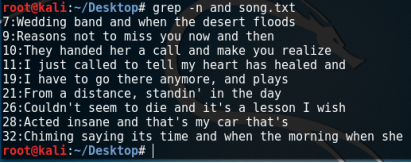
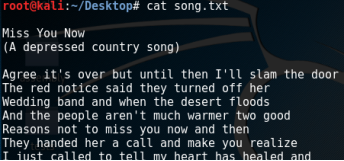
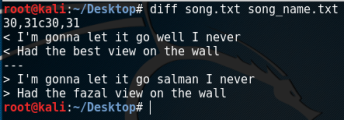
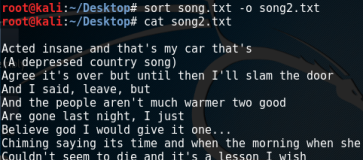




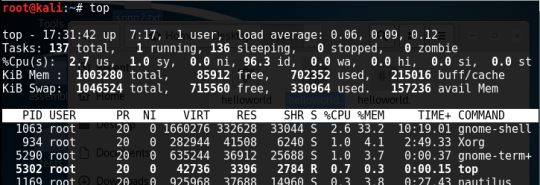
The ‘more’ command works similarly to the cat command by displaying contents of a file, however the more command, you view bits of the text (a screenful), and is in a forward-scrollable manner.
The ‘less’ command is similar to the more command, however with this it is possible to scroll both, forward and backward.
The ‘most’ command is more like the less command, but the only difference is, it is possible to view several files at once with this command.
The basic syntax for these commands are:
- more
- less
Lab Activity 4 Bootloader
- Brief description of the Lab activity and what you did
This weeks task was to create a bootloader using Assembly which included my student details and a triangle of dots. We then have to boot the bootloader with bochs.
- Boot pragma linux with bochs
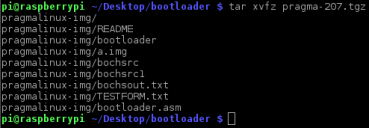


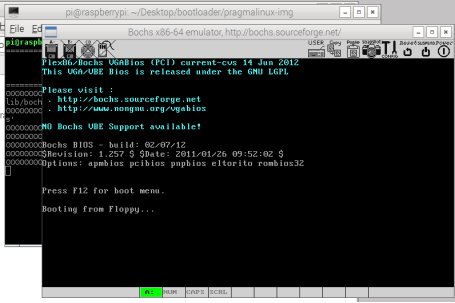
- Make a bootloader that displays your student details and triangle
- Commented bootloader code to display your student details and triangle
[BITS 16]
[ORG 0x7C00]
top:
;; Put 0 into ds (data segment)
;; Can’t do it directly
mov ax,0x0000
mov ds,ax
;; si is the location relative to the data segment of the
;; string/char to display
mov si, msg
call writeString ; See below
jmp $ ; Spin
writeString:
mov ah,0x0E ; Display a chacter (as before)
mov bh,0x00
mov bl,0x07
nextchar:
Lodsb ; Loads [SI] into AL and increases SI by one
;; Effectively “pumps” the string through AL
cmp al,0 ; End of the string?
jz done
int 0x10 ; BIOS interrupt
jmp nextchar
done:
ret
msg db ‘Name: Salman Fazal’,13,10, ‘Email: salmanfazal01@gmail.com’, 13,10, ‘Fav Module: 207SE ;)’, 13,10, ‘DOB: 01/08/1996 – 21’ ,13,10, ‘Std ID: 6669447’ ; Null-terminated
times 510-($-$$) db 0
dw 0xAA55
- Output from Bochs showing student details and triangle
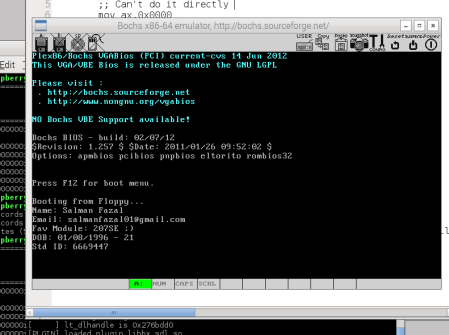
Lab Activity 6 Memory Management
- Memory Allocation Activities
Due to the code outputs being too long, I have just snipped a portion of the result, however all of my answers match with the results in the code.
* NULL = Memory address not allocated.
First-Fit


Best-Fit


Worst-Fit


- Paging Activities
FIFO
|
4 |
2 |
7 |
7 |
5 |
6 |
3 |
9 |
3 |
2 |
2 |
|
|
Page Entry 0 |
4 |
4 |
4 |
4 |
5 |
5 |
5 |
9 |
9 |
9 |
9 |
|
Page Entry 1 |
2 |
2 |
2 |
2 |
6 |
6 |
6 |
6 |
2 |
2 |
|
|
Page Entry 2 |
7 |
7 |
7 |
7 |
3 |
3 |
3 |
3 |
3 |
||
|
Page Fault |
F |
F |
F |
H |
F |
F |
F |
F |
H |
F |
H |
Page Fault Total: 8
|
4 |
2 |
7 |
7 |
5 |
6 |
3 |
9 |
3 |
2 |
2 |
|
|
Page Entry 0 |
4 |
4 |
4 |
4 |
4 |
6 |
6 |
6 |
6 |
6 |
6 |
|
Page Entry 1 |
2 |
2 |
2 |
2 |
2 |
3 |
3 |
3 |
3 |
3 |
|
|
Page Entry 2 |
7 |
7 |
7 |
7 |
7 |
9 |
9 |
9 |
9 |
||
|
Page Entry 3 |
5 |
5 |
5 |
5 |
5 |
2 |
2 |
||||
|
Page Fault |
F |
F |
F |
H |
F |
F |
F |
F |
H |
F |
H |
Page Fault Total: 8
RANDOM
|
4 |
2 |
7 |
7 |
5 |
6 |
3 |
9 |
3 |
2 |
2 |
|
|
Page Entry 0 |
4 |
4 |
4 |
4 |
5 |
6 |
6 |
6 |
6 |
2 |
2 |
|
Page Entry 1 |
2 |
2 |
2 |
2 |
2 |
2 |
9 |
9 |
9 |
9 |
|
|
Page Entry 2 |
7 |
7 |
7 |
7 |
3 |
3 |
3 |
3 |
3 |
||
|
Page Fault |
F |
F |
F |
H |
F |
F |
F |
F |
H |
F |
H |
Page Faults Total: 8
|
4 |
2 |
7 |
7 |
5 |
6 |
3 |
9 |
3 |
2 |
2 |
|
|
Page Entry 0 |
4 |
4 |
4 |
4 |
4 |
4 |
4 |
9 |
9 |
9 |
9 |
|
Page Entry 1 |
2 |
2 |
2 |
2 |
2 |
2 |
2 |
2 |
2 |
2 |
|
|
Page Entry 2 |
7 |
7 |
7 |
7 |
3 |
3 |
3 |
3 |
3 |
||
|
Page Entry 3 |
5 |
6 |
6 |
6 |
6 |
6 |
6 |
||||
|
Page Fault |
F |
F |
F |
H |
F |
F |
F |
F |
H |
H |
H |
Page Fault Total: 7
The random algorithm did not give me the same result as the way I solved it. This is because There is no specific rule/method on what memory block to be replaced. Each time a process needs to be moved to a memory block, a random memory block is chosen in order to swap the process.
Evidence of running code
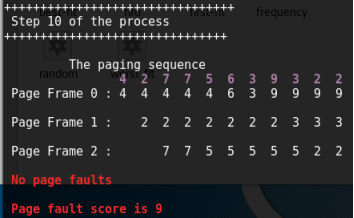
Lab Activity 7 Buffer
- Brief description of the Buffer Activity
This weeks task involved using buffers in terms of reading and writing from a file
- Commented Buffer.c code
- #include
//library for file control options - #include
//library for general purpose tools - #include
//header file - #include
//file IO - #define BUF_SIZE 500 //sets buffer size to 500
- #define OUTPUT_MODE 0700 //defines the output mode, sets file permissions
- int main(int argc, char *argv[]) {
- //Define variables
- int in_fd, out_fd; //hold associated numbers on both files
- int rd_size = 1; //hold amount of bytes in buffer (final should be 500)
- int wr_size; //hold amount of bytes on the output file
- char buf[BUF_SIZE]; //initialise buffer and its size
- if (argc != 3) //check for correct number of arguments
- exit(1); //exit if too many or too few parameters
- in_fd = open(argv[1], O_RDONLY); //open file to read from (read only)
- //if file isn’t found, variable will have a negative number
- if (in_fd < 0)
- exit(2); //exit if file’s empty
- out_fd = creat(argv[2], OUTPUT_MODE); //create the output file
- //if file isn’t created, variable will have a negative number
- if (out_fd < 0)
- exit(3); //exit if cannot write to the file
- while (rd_size > 0) { //while characters (in file) still exist:
- rd_size = read(in_fd, buf, BUF_SIZE); //read the file into buffer
- if (rd_size < 0)
- exit(4); //exit if error while reading
- wr_size = write(out_fd, buf, rd_size); //write from buffer into file
- if (wr_size <= 0) {
- close(in_fd);
- close(out_fd); //close both of the files if error found
- exit(5); //exit if error while writing
- }
- }
- }
- Update the code to so that it prints if an error has occurred or if a file is successfully created with the content of the review in it.
After running code what is in hamlet.txt
- #include
//library for file control options - #include
//library for general purpose tools - #include
//header file - #include
//file IO - #define BUF_SIZE 500 //sets buffer size to 500
- #define OUTPUT_MODE 0700 //defines the output mode, sets file permissions
- int main(int argc, char *argv[]) {
- //Define variables
- int in_fd, out_fd; //hold associated numbers on both files
- int rd_size = 1; //hold amount of bytes in buffer (final should be 500)
- int wr_size; //hold amount of bytes on the output file
- char buf[BUF_SIZE]; //initialise buffer and its size
- if (argc != 3) { //check for correct number of arguments
- printf(“Error: Invalid number of parameters passed.”);
- exit(1); //exit if too many or too few parameters
- }
- in_fd = open(argv[1], O_RDONLY); //open file to read from (read only)
- //if file isn’t found, variable will have a negative number
- if (in_fd < 0) {
- printf(“Error: File not found.”);
- exit(2); //exit if file’s empty
- }
- out_fd = creat(argv[2], OUTPUT_MODE); //create the output file
- //if file isn’t created, variable will have a negative number
- if (out_fd < 0) {
- printf(“Error: File not created.”);
- exit(3); //exit if cannot write to the file
- }
- while (rd_size > 0) { //while characters (in file) still exist:
- rd_size = read(in_fd, buf, BUF_SIZE); //read the file into buffer
- if (rd_size < 0) {
- printf(“Error: Can’t read from file.”);
- exit(4); //exit if error while reading
- }
- wr_size = write(out_fd, buf, rd_size); //write from buffer into file
- if (wr_size <= 0) {
- close(in_fd);
- close(out_fd); //close both of the files if error found
- exit(5); //exit if error while writing
- }
- }
- printf(“Operation Successful!”);
- }
After compiling and running the code, the hamlet.txt file contained the exact same text that was in the main review.txt file
Evidence:

- Updated buffer.c code to show how many character are read to buffer, how many character read at a time into the buffer, how many words in the document and how many times the buffer is filled
- #include
//library for file control options - #include
//library for general purpose tools - #include
//header file - #include
//file IO - #define BUF_SIZE 500 //sets buffer size to 500
- #define OUTPUT_MODE 0700 //defines the output mode, sets file permissions
- int main(int argc, char *argv[]) {
- //Define variables
- int in_fd, out_fd; //hold associated numbers on both files
- int rd_size = 1; //hold amount of bytes in buffer (final should be 500)
- int wr_size; //hold amount of bytes on the output file
- char buf[BUF_SIZE]; //initialise buffer and its size
- int rd_count = 0, buf_count = 0, wd_count = 0;
- if (argc != 3) { //check for correct number of arguments
- printf(“Error: Invalid number of parameters passed.”);
- exit(1); //exit if too many or too few parameters
- }
- in_fd = open(argv[1], O_RDONLY); //open file to read from (read only)
- //if file isn’t found, variable will have a negative number
- if (in_fd < 0) {
- printf(“Error: File not found.”);
- exit(2); //exit if file’s empty
- }
- out_fd = creat(argv[2], OUTPUT_MODE); //create the output file
- //if file isn’t created, variable will have a negative number
- if (out_fd < 0) {
- printf(“Error: File not created.”);
- exit(3); //exit if cannot write to the file
- }
- while (rd_size > 0) { //while characters (in file) still exist:
- rd_size = read(in_fd, buf, BUF_SIZE); //read the file into buffer
- if (rd_size < 0) {
- printf(“Error: Can’t read from file.”);
- exit(4); //exit if error while reading
- }
- if (rd_size == 500){ //if read,
- rd_count += 500;
- buf_count += 1; //increment character and buffer counter
- } else{
- rd_count += rd_size;
- }
- for (int i=0; i
- if(buf[i] == ‘ ‘)
- wd_count+=1; //increment if space found
- }
- wr_size = write(out_fd, buf, rd_size); //write from buffer into file
- if (wr_size <= 0) {
- printf(“Successfully written to file!n”);
- close(in_fd);
- close(out_fd); //close both files
- printf(“Total number of characters read is: %d.n”, rd_count);
- printf(“Total number of words: %d.n”, wd_count);
- printf(“Buffer filled %d times.n”, buf_count);
- exit(5);
- }
- }
- }

- Impact of changing buffer size
I altered the buffer 3 times, the first was changing the size to 1000, the second was 1300 and the third was 2000. What I noticed was as the buffer size increases, the amount of times the buffer is filled decreases as the buffer is able to fill in more characters each time. Below is a screen shot of when the buffer size was set to 2000:

We can see the buffer at this time was filled 0 times, meaning the entire text was placed into the buffer.
- Updated buffer.c code to compare if two files are the same
- #include
//library for file control options - #include
//library for general purpose tools - #include
//header file - #include
//file IO - #define BUF_SIZE 500 //sets buffer size to 500
- #define OUTPUT_MODE 0700 //defines the output mode, sets file permissions
- int main(int argc, char *argv[]) {
- //Define variables
- int in_fd, in_fd2; //hold associated numbers on both files
- int rd_size = 1; //hold amount of bytes in buffer (final should be 500)
- int rd_size2 = 1;
- char buf[BUF_SIZE]; //initialise buffer and its size
- char buf2[BUF_SIZE]; //initialise buffer and its size
- //int rd_count = 0, buf_count = 0, wd_count = 0;
- if (argc != 3) { //check for correct number of arguments
- printf(“Error: Invalid number of parameters passed.”);
- exit(1); //exit if too many or too few parameters
- }
- in_fd = open(argv[1], O_RDONLY); //open first file to read from
- if (in_fd < 0) {
- printf(“Error: File not found.”);
- exit(2); //exit if file’s empty
- }
- in_fd2 = open(argv[2], O_RDONLY); //open second file to read from
- //if file isn’t found, variable will have a negative number
- if (in_fd2 < 0) {
- printf(“Error: File not found.”);
- exit(3); //exit if file’s empty
- }
- while (rd_size > 0 && rd_size2 > 0) { //while characters (in file) still exist:
- rd_size = read(in_fd, buf, BUF_SIZE); //read file 1 to buffer
- rd_size2 = read(in_fd2, buf2, BUF_SIZE); //read file 2 to buffer
- if (rd_size < 0 || rd_size2 < 0) { //error if any file is empty
- printf(“Error: Can’t read from file.”);
- exit(4);
- }
- for (int i=0; i
- if(buf[i] != buf2[i]){ //if characters of the 2 files are not the same:
- printf(“The files are not the same!”);
- close(in_fd);
- close(in_fd2);
- exit(5); //print message and close
- }
- }
- }
- printf(“YESSSSSS!! The files are the same.”); //if code passes the loop, they’re the same!
- }
- Comparison of review.txt and hamlet.txt
- Comparison of hamlet.txt and review_observer.txt

Lab Activity 8 Cache Buffer
- Brief Description of Cache Buffer Activity
This weeks task was to alter the cache_reader.c file and complete the cr_read_byte function. Additionally, we also had to add a count of the total number of bytes and the number of times the buffer was filled.
- Commented implementation of the cr_read_byte function
- char cr_read_byte(cr_file* f){
- /* 1. check if buffer needs refilling
- 2. return currently pointed character
- 3. move pointer to next character */
- if(f->usedbuffer >= f->bufferlength){
- refill(f);
- }
- char currentChar = f->buffer[f->usedbuffer];
- f->usedbuffer++;
- return currentChar;
- }

- Comment updated code to show that each byte is being read, and when the buffer is being refilled.
To show that the buffer is being refilled, I added a print statement each time the buffer refills in the cr_read_byte() function. Also the next part of the question will show that the buffer is being refilled and the bytes are being read by keeping a count each time that happens.
*The code for this part of the question is combined with the next part (cache_reader.c).
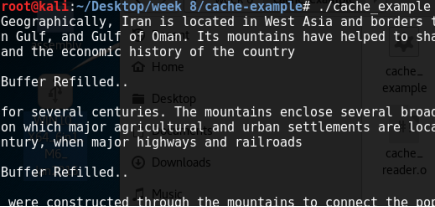
(I set the buffer to 200)
- Commented updated code showing to show how many bytes were read in total, and how many times the buffer was refilled
In this part, I had to update the code in 3 different files, below are the screenshots of every update I made:
cache_reader.h
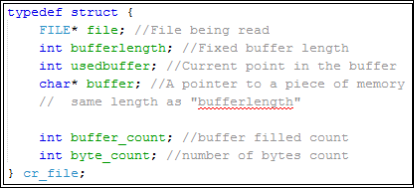
In this sec
Cite This Work
To export a reference to this article please select a referencing stye below:
Related Services
View allDMCA / Removal Request
If you are the original writer of this essay and no longer wish to have your work published on UKEssays.com then please click the following link to email our support team:
Request essay removal


